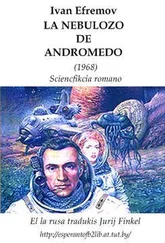Ivan Yefremov - Andromeda (A Space-Age Tale)
Здесь есть возможность читать онлайн «Ivan Yefremov - Andromeda (A Space-Age Tale)» весь текст электронной книги совершенно бесплатно (целиком полную версию без сокращений). В некоторых случаях можно слушать аудио, скачать через торрент в формате fb2 и присутствует краткое содержание. Город: Moscow, Год выпуска: 1959, Издательство: FOREIGN LANGUAGES PUBLISHING HOUSE, Жанр: Фантастика и фэнтези, на английском языке. Описание произведения, (предисловие) а так же отзывы посетителей доступны на портале библиотеки ЛибКат.
- Название:Andromeda (A Space-Age Tale)
- Автор:
- Издательство:FOREIGN LANGUAGES PUBLISHING HOUSE
- Жанр:
- Год:1959
- Город:Moscow
- ISBN:нет данных
- Рейтинг книги:5 / 5. Голосов: 1
-
Избранное:Добавить в избранное
- Отзывы:
-
Ваша оценка:
- 100
- 1
- 2
- 3
- 4
- 5
Andromeda (A Space-Age Tale): краткое содержание, описание и аннотация
Предлагаем к чтению аннотацию, описание, краткое содержание или предисловие (зависит от того, что написал сам автор книги «Andromeda (A Space-Age Tale)»). Если вы не нашли необходимую информацию о книге — напишите в комментариях, мы постараемся отыскать её.
Andromeda (A Space-Age Tale) — читать онлайн бесплатно полную книгу (весь текст) целиком
Ниже представлен текст книги, разбитый по страницам. Система сохранения места последней прочитанной страницы, позволяет с удобством читать онлайн бесплатно книгу «Andromeda (A Space-Age Tale)», без необходимости каждый раз заново искать на чём Вы остановились. Поставьте закладку, и сможете в любой момент перейти на страницу, на которой закончили чтение.
Интервал:
Закладка:
There was a layer of light-blue clouds over the daylight side of Earth that reflected the powerful light of the blue-grey Sun. Anybody who looked at the clouds except through dark filters would be blinded as would anybody unprotected by the 800 kilometres of Earth’s atmosphere who turned his face to the Sun. The harsh short-wave rays — ultra-violet and X-rays were irradiated in a powerful stream that was lethal to all living things. A constant downpour of cosmic particles was added to the stream. Newly-awakened stars or those that had collided at unimaginably great distances in the Galaxy sent deadly radiation out into space. Only the reliable protection of their spacesuits saved the workers from speedy death.
Darr Veter threw the safety line over to the other side and moved towards the radiant dipper of Ursa Major. A giant pipe had been fixed in position throughout the entire length of the future satellite. At either end acute-angled triangles rose up from it to support the discs radiating the magnetic field. When the batteries transforming the Sun’s blue radiations into electricity were installed it would be possible to do away with lifelines and walk along the lines of force in the magnetic field with directional plates on the chest and back.
“We want to work at night.” The voice of a young engineer, Cadd Lite, suddenly sounded in his space helmet. “Altai has promised to provide the light.”
Darr Veter looked to the left and below where a bunch of cargo rockets, tied together, lay like sleeping fish. Above them, under a flat roof to protect it from meteorites and the Sun, floated the temporary platform built from the inner plating of the satellite where all the components brought by the rockets were stored and assembled. Workers crawling there like black bees suddenly turned to glow-worms when the reflecting surfaces of their space-suits moved beyond the shadow of the roof. A cobweb of ropes stretched from the gaping hatches in the sides of the rockets out of which big components were being unloaded. Higher still, directly over the hull of the satellite, a group of people in strange, often ridiculous, poses were busy round a huge machine. One ring of beryllium bronze with borason plating would have weighed at least a hundred tons on Earth. Here the huge mass was dangling beside the metal skeleton of the satellite on a thin wire rope whose only purpose was to keep all these components rotating round Earth at the same velocity.
The workers became confident and agile once they had become accustomed to the absence of weight or rather, to the negligible weights. These skilled workers, however, would soon have to be replaced by others. Lengthy periods of physical labour without gravitation lead to disturbances in blood circulation which might become chronic and make the sufferer a permanent invalid on his return to Earth. For this reason the shift on the satellite was one of fifty working hours after which the worker returned to Earth, going through reacclimatization at the Intermediate Station revolving round the Earth at a height of 900 kilometres.
Darr Veter directed the assembly of the satellite and tried to avoid physical exertion although, at times, he badly wanted to help hasten the completion of some job or another. He would have to hold out at a height of 57,000 kilometres for several months.
If he agreed to night work he would have to send his young workers back to the planet and call others before time. Barion, the construction job’s second planetship was on the Arizona Plain where Grom Orme sat at the TVP screens and registration machine controls.
A decision to work through the entire icy Cosmic night would have reduced the time required for assembling the satellite by one half and Darr Veter could not let such an opportunity pass. As soon as they had obtained h’s consent the workers came down from the platform, running about in all directions, making a still more complicated network of ropes. The planetship Altai that served as living quarters for the satellite builders and hung motionless, moored to one end of the satellite’s main beam, suddenly cast off the hawsers that linked her main hatch with the satellite. A long stream of blinding flame shot out of her exhausts. The huge ship swung round swiftly and silently, not the slightest noise carrying through the emptiness of interplanetary space. The skilled commander of Altai needed no more than a few strokes of his engines to send the ship forty metres above the structure and turn with his landing lights directed at the assembly platform. Hawsers were again dropped between the ship and the satellite and the whole mass of objects suspended in space became motionless relative to each other as they continued their revolutions round the Earth at a speed of about ten thousand kilometres an hour.
The distribution of the cloud masses told Darr Veter that the construction job was passing over the Antarctic region of the planet and would, therefore, soon enter Earth’s shadow. The improved heating system of the spacesuit could not fully guarantee its wearer against the bitter cold of Cosmic space and woe betide the careless traveller who exhausted his batteries. An architect-erector had been killed that way a month before when he hid from a meteorite shower in the cold shell of an open rocket. He did not live to reach the sunny side of the planet. Another engineer was killed by a meteorite — such occurrences could not be foreseen or prevented with any degree of certainty. The building of a satellite always claimed its victims and nobody knew who would be the next. The laws of stochastics, although only partly applicable to such tiny particles as individual people, said that he, Darr Veter, would most probably be the next because he would be there, at that height and open to all the vagaries of the Cosmos, longer than anybody else. There was an impudent little inner voice, however, that told Darr Veter that nothing could possibly happen to his magnificent person. No matter how ridiculous such confidence may have been for a mathematically minded man it never abandoned Darr Veter and helped him calmly balance himself on narrow girders and grilles on the open, unprotected hull of the satellite in the abyss of the black sky.
Structures on Earth were erected by special machines called embryotecti because they worked on the principle of the cybernetic development of the living organism. It goes without saying that the molecular structure of the living organism, effected by the hereditary cybernetic mechanism, was immeasurably more complicated.
Living organisms, however, could only grow in the conditions provided by warm solutions of ionized molecules while the embryotecti usually worked in polarized streams of electricity or light or in a magnetic field. The markings and keys on all the component parts painted in radioactive thallium gave the correct orientation to the machines assembling them precisely and at high speed. At the great height of the satellite there were not and could not be any such machines. The assembly of the satellite was an old-fashioned building job employing human hands. Despite the dangers involved the work seemed so interesting that it attracted thousands of volunteers. The psycho-physiological stations were scarcely able to examine the flood of volunteers desirous of informing the Council of their readiness to venture into interplanetary space.
Darr Veter reached the foundations of the solar machines that were arranged fanwise round a huge hub containing the artificial gravity apparatus and joined the battery he was carrying on his back to the terminals of the test circuit. A simple melody could be heard in the phones of his space helmet. Then he connected in parallel a glass plate with the thin gold lines of a drawing on it. It produced the same melody. Darr Veter turned a couple of vernier scales until points of time coincided and listened to make sure there was no difference in the melody or even in the tone of the tuning. An important part of the future satellite had been assembled faultlessly. They could now begin the erection of the radiation electric motors. Darr Veter straightened shoulders that were bent wearily under the weight of a spacesuit worn over a long period and turned his head to the right and to the left. The movement caused a creaking of the upper vertebrae that immobility in the space helmet had made stiff. It was a good thing that, so far, Darr Veter had proved impervious to the psychoses that affect those who work outside the terrestrial atmosphere — these included ultra-violet sleeping sickness and infrared madness — otherwise he would not have been able to bring his worthy mission to a successful conclusion.
Читать дальшеИнтервал:
Закладка:
Похожие книги на «Andromeda (A Space-Age Tale)»
Представляем Вашему вниманию похожие книги на «Andromeda (A Space-Age Tale)» списком для выбора. Мы отобрали схожую по названию и смыслу литературу в надежде предоставить читателям больше вариантов отыскать новые, интересные, ещё непрочитанные произведения.
Обсуждение, отзывы о книге «Andromeda (A Space-Age Tale)» и просто собственные мнения читателей. Оставьте ваши комментарии, напишите, что Вы думаете о произведении, его смысле или главных героях. Укажите что конкретно понравилось, а что нет, и почему Вы так считаете.











